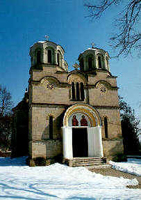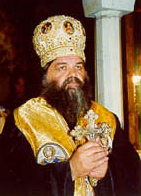Enter content here A British soldier braves a dust storm at the Macedonian airport in Skopje on August 21, 2001. NATO governments approved plans on August 22 to send thousands of troops to collect weapons from ethnic Albanian rebels in Macedonia, launching the alliance's third Balkans mission in a decade. (Petr Josek/Reuters) Capt. Gareth Hicks (C), liaison officer from the British 16 Air Assault Brigade, walks past a damaged mosque accompanied by an ethnic Albanian rebel fighter (L), in the National Liberation Army stronghold village of Nikustak, north-west of the capital Skopje, August 20, 2001. NATO's supreme commander found favorable conditions for an alliance mission to disarm rebels in Macedonia, making it more likely that it will be authorized soon by NATO ambassadors, diplomats indicated August 21. (Darko Bandic/Pool via Reuters) British troops of the 16 Air Assault Brigade's "Pathfinder Platoon" drive away from a C-130 Hercules transport aircraft following their arrival at Skopje airport, Macedonia, August 20, 2001. A total of 377 British troops have now arrived in the Former Yugoslavian Republic of Macedonia, their task being to begin the collection of weapons from the Albanian rebels on the Kosovo-Macedonia border. REUTERS/Mark Ballantyne/British Army A truck adds sand to a roadblock on the Macedonia-Kosovo border at Blace, August 21, 2001 where around 50 people stopped NATO troops crossing the border in protest against Albanian rebels in the area who have been fighting government forces during the last six months. NATO military officials have provisionally backed a plan to send thousands of troops to Macedonia, and alliance ambassadors are expected to give their final endorsement by Wednesday, sources said on Tuesday. REUTERS/Ognen Teofilovski NATO May Shoot Itself in the Foot in Macedonia. TIME Even if it holds, the current peace plan has rewarded separatist violence. And that sets an unhappy precedent for an unhappy region.
Tuesday, Aug. 21, 2001
Kill one person and they'll hang you; kill 100 and they'll make a deal with you.
That's the philosophy of the "dacoit" bandits who maraud across India's impoverished northern plains. And it's a message that finds an unlikely echo in NATO's handling of the Macedonia crisis.
The Western alliance is currently patting itself on the back for acting early, so as to prevent Macedonia becoming another Balkan bloodbath. It has sent in an advance team of 400 soldiers, soon to be accompanied by a further 3,100, on a 30-day mission to collect whatever weapons the ethnic-Albanian guerrillas of the National Liberation Army deign to hand over. Of course many of those guerrillas, particularly the more militant factions based around Tetovo, are still actively using those weapons and it's hard to imagine they'll be ready to hand them over in the next couple of days or weeks when they're still being fired on a daily basis. No matter for NATO, of course, because its spokesmen insist that the alliance's mission is not to disarm anyone, but simply to collect weapons voluntarily handed over. (Indeed, it must be deeply reassuring to all peace-loving Macedonians that the Western military alliance has vowed to simply pack up and go home if the fighting resumes.)
The basis for believing that the guerrillas plan to disarm is a political agreement concluded last week in Skopje between the country's main parliamentary parties to greatly expand ethnic-Albanian cultural rights in Macedonia. But the guerrillas have no direct role in negotiating that agreement, and their compliance is based entirely on goodwill. It is also based, in other words, on accepting at face value the National Liberation Army's claim to have taken up weapons simply to pursue expanded cultural and civil rights within Macedonia's democracy, rather than to create a separate Albanian entity within the country as part of a "Greater Albania" project incorporating Kosovo.
Many of the rank-and-file guerrillas and regional commanders openly express their enthusiasm for a "Greater Albania" the mirror image of Slobodan Milosevic's "Greater Serbia" campaign, which spawned separatist military campaigns among the Serb minorities of Serbia's neighboring states. But their leaders insist they got most of what they wanted out of the Skopje political agreement, and the time has come to put down their weapons. And those leaders have plenty of reasons to crow about the outcome. Three months ago, NATO leaders were still denouncing the NLA as "terrorists" and "murderers in the hills"; now fresh-faced young British liaison officers come calling to politely inquire, over coffee, when the guerrillas might be ready to hand over their weapons. The Skopje agreement may have been signed with the mainstream ethnic-Albanian political parties, but all eyes are on the rebel commander Ali Ahmeti and what his next move may be. The Macedonians, of course are outraged, insisting that Ahmeti is still the same man once denounced as a terrorist by NATO a man they'd like to put behind bars or up against a wall, although they've been forced to agree to an amnesty. Instead, the deal brokered by NATO has put him at center stage, made him a kind of raffish darling of the Western media and most importantly, handed him the political initiative in a volatile situation.
So why did NATO decide to turn Ahmeti from a "terrorist" into a respectable citizen? Essentially, because the alliance was never prepared to risk exposing its troops to danger in any confrontation with Albanian nationalists. Although it made limited attempts to seal the Kosovo border, across which all of the NLA's weapons, supplies and personnel initially passed, once the guerrillas had proved their ability to survive the clumsy counterinsurgency efforts of the Macedonian security forces, NATO changed its tack, turning the "terrorists" of three months ago into the key partner of today's peace deal.
NATO may protest that its peace plan requires the disarmament of the ethnic-Albanian guerrillas. Indeed. So did the agreement that ended the Kosovo war two years ago, and NATO failed conspicuously to enforce it there. Perhaps that's why this time the definition of its mission very definitely excludes the term "disarm."
And, of course, Macedonia and Kosovo are hardly unconnected. The Macedonian insurgency originated inside Kosovo, where NATO is supposed to be in charge of security. But the alliance has shown little inclination to effectively police the activities of Albanian nationalist guerrillas there, and it appears to have woken up rather late to the fact that those guerrillas were exporting an insurgency into Macedonia under NATO's very noses. Although it then moved very quickly to press the authorities to address the political grievances on which the insurgency was feeding, it did little to create disincentives for ethnic-Albanian nationalists to choose the path of violence.
So, while NATO may believe that it has acted precipitously to prevent another bloodbath, it has also sent an unfortunate message to separatist movements all over the Balkans: NATO won't tolerate armed separatist movements, but nor will it do anything to stop them. In other words, organize an army of weekend warriors, start shooting at the authorities, don't blink when NATO calls you names, and sooner or later they'll be negotiating with you. Or, to put more succinctly: kill 100, and they make a deal with you Ethnic Slavs continue to flee FYR of Macedonia town, UN refugee agency says. U.N. 21 August A week after a peace agreement was signed in the former Yugoslav Republic of Macedonia, small groups of ethnic Macedonians continue to flee the troubled town of Tetovo, where intermittent mortar exchanges have been reported since the weekend, the United Nations High Commissioner for Refugees (UNHCR) said today.
Displaced ethnic Macedonians at a collective centre in Kumanovo said they were willing to return to their homes if their security could be guaranteed, UNHCR spokesman Kris Janowski said at a press briefing in Geneva. "They told UNHCR they were worried about reports that ethnic Albanian rebels were looting and burning Macedonian and Serb homes in the villages they left behind," he said.
In the capital Skopje, several hundred displaced people barricaded a road leading to the border crossing at Blace, preventing the return of refugees from Kosovo. More than 27,000 refugees have gone back, but over the past three days there have been no returns from Blace, Mr. Janowski said.
Meanwhile, life is increasingly returning to normal at Aracinovo, a largely Albanian village just outside Skopje, where up to 8,000 residents have returned since they fled heavy fighting in June, the spokesman said.
"Many houses have been repaired with UNHCR plastic sheeting, children were out playing in the streets and some shops have reopened," Mr. Janowski said. "However, only several Macedonians have gone back to Aracinovo. They told UNHCR that resumption of electrical service could encourage more returns to the area."
UNHCR has been sending mobile teams to Aracinovo in an attempt to boost confidence, stressing the need to address the security concerns of the displaced, particularly the ethnic Macedonians who fled areas where they were a minority. "Creating conditions for their safe return is critical in the successful implementation of the peace agreement," Mr. Janowski said.  ALBANIAN TERRORISTS DESTROYED CHURCH "SAINT ATANASIJ" IN LESOK. MIA Early Tuesday, at around 03.10 hours, Albanian terrorists completely destroyed the church "St. Atanasij", within the complex of Lesok monastery.
The terrorists planted an explosive device in the church, and destroyed the monastery building, valuable icons and frescos and the wood-carved altar.
"The ancient sanctuary from the 13th century in Lesok is protected by the Law on protection of monuments," said Mirko Stankovski, Archpriest Very Reverend of Tetovo Bishop's Regency.
He says the Church "St. Atanasij" built in 1924 and dedicated in 1936. Albanian terrorists use all means to destroy everything that is a symbol of Christianity and "we are afraid they will destroy the entire monastery complex from the 13th century."
The Macedonian Ministry of Interior announced that Tuesday morning at 03.10h, members of the so-called NLA destroyed with dynamite the entry gate, central cupola and iconostasis of the Lesok Monastery.
This vandalistic act, carried out only few days before the great religious holiday Virgin Mary, not only harms the soul of every orthodox Macedonian but also confirms the anti-historic mentality of the Albanian terrorists who still live as savages who do not recognize anything as secret, the announcement reads.
Destroying the Lesok Monastery, the terrorists desecrated the Christian gate placed in Macedonia 2000 years ago by Apostles Paul.
The Ministry of Interior is doing everything in its power to discover and arrest the people responsible of this criminal act against the humanity.  DESTRUCTION OF LESOK MONASTERY IS A HUGE BLOW FOR MACEDONIA. MIA Archbishop of Ohrid and Macedonia Stefan and Metropolitan of Polog and Kumanovo Kiril condemned last night's destruction of Lesok monastery by the Albanian terrorists.
"This news was painfully accepted by the members of the Macedonian Orthodox Church, the Holy Archbishop Synod and the followers", Archbishop of Ohrid and Macedonia Stefan stated.
"I would like to ask whether this act is directed against the religion in this region and the Macedonian orthodox population, against the Macedonian state or maybe against the recently signed Framework Agreement and the efforts to bring back peace in the country", Pontiff of Macedonian Orthodox Church stressed.
According to Metropolitan of Polog and Kumanovo Kiril, the destruction of Lesok monastery means the destruction of the "cathedral temple and ancient monastery sanctuary, together with the church "St. Bogorodica" (Holy Mother of God) dating from the 13th century and the monastery above the cathedral temple dating from the 12th and 13th century.
He informed that only the western part of this valuable architecture work, which was built in 1924, a small part of the gallery and the bell tower remained untouched.  CULTURE MINISTER: I AM NOT SURPRISED FROM THIS BARBARIAN ACT, ONLY SHUDDERED. "I am not surprised from this barbarian act, I am only shuddered that cultural monument has been destroyed, Lesok monastery that dates back from the 14th century and is protected under the law," Macedonian Culture Minister Ganka Samoilovska - Cvetanova stated Tuesday.
"I am not surprised, because other things can be expected by this barbarian terrorist organization. Under the motto for better human rights they reached for the most precious - the human lives, for the highest achievements of the civilization - the cultural monuments of Republic of Macedonia, which are part of the world's cultural inheritance in the time when the peace agenda of Macedonian President Boris Trajkovski is implemented, when cease-fire is declared and when Framework agreement is signed," Samoilovska- Cvetanova said.
"What else could be expected from such barbarian terrorist organization led by a man who had his political promotion two days ago. He arrived on the occupied Macedonian territory with stolen vehicles from the Government and held his press-conference in school, for which the Macedonian Government has granted US $1,2 million," Culture Minister said.
"The World history experienced another similar example and that is the destruction of Buddhist monuments in Afghanistan by the Talibans. At that time the entire public condemned the act, but now certain international factors support this Balkans' Talibans so I publicly appeal to the international community and all factors in the country regardless of their political or religious belonging to condemn this act and to distance themselves from destroying cultural monuments in Republic of Macedonia," Minister Samoilovska - Cvetanova said. Even as NATO moves in, Macedonia's cease-fire remains tenuous. AP By Aleksandar Vasovic, Associated Press, 8/21/2001 02:11
RATAE, Macedonia (AP) Mira Dimova has reason to be skeptical that NATO troops will find it peaceful enough here to collect weapons from ethnic Albanian rebels.
The 58-year-old Macedonian villager and her son were out tending their cows Sunday when .50 caliber bullets hit a car less then a yard from where they were standing in the village of Ratae, just outside the country's second-largest city, Tetovo.
''I was so afraid that I couldn't leave my house this morning,'' she said, pointing to the yellow Volkswagen's shattered windows.
NATO has said it will deploy a 3,500 strong British-led force to Macedonia when it is confident that the cease-fire is viable. No one is really offering a definition of just how much fighting NATO is willing to endure and still claim a cease-fire is under way.
To help determine if the time is right, NATO's supreme commander in Europe, U.S. Gen. Joseph Ralston, met with the country's top officials and senior military leaders. He will report to the alliance's ruling council on Tuesday and advise them whether to give the go-ahead for a full deployment.
NATO officials said it was unlikely the North Atlantic Council, made up of ambassadors from each of alliance's 19 member nations, will decide on the deployment Tuesday. More likely, they said, the council will discuss the findings and decide later in the week.
The council's next regularly scheduled meeting is Wednesday.
Ralston's visit to the Macedonian capital, Skopje, came as an advance team moved into the countryside to make contact with ethnic Albanian rebels, who must disarm under a peace deal signed earlier this month.
The British liaison team from the 16 Air Assault Brigade traveled to Nikustak, a rebel-held village along the front-line about 10 miles northeast of the capital, Skopje. The team was meeting with local rebel commanders to discuss details of how the British-led weapons collection mission, dubbed Operation Essential Harvest, would work.
But even if NATO decides to move in, they'll find it hard to persuade people under attack that lasting peace is achievable.
The rebels launched their insurgency six months ago, claiming they were fighting for more rights for the country's ethnic Albanians, who make up as much as one-third of the country's population of 2 million.
The Macedonian government says the insurgents want to capture territory and have their own state.
Dozens of people were killed and thousands were displaced before ethnic Albanian and Macedonian leaders accepted a peace deal. Under the deal that grants ethnic Albanians more rights, NATO troops will move in to disarm the rebels.
In Washington, a senior U.S. official said that without the peace deal Macedonia would have splintered into Macedonian and ethnic Albanian sectors. The official, speaking on condition of anonymity, said the Albanians cared most about formal recognition of the Albanian language as part of the agreement.
The agreement also grants the restive minority a greater role in police, parliament and education. NATO's involvement was also envisioned under the deal, which has been widely published in local newspapers and appears on the web page of the Macedonian president's office.
Under the agreement, the United States will help in the training of the police force, which is to include more ethnic Albanian recruits, the official said.
In a sign that the government is committed to the accord, the Defense Ministry announced Monday that the army would pull back from areas where rebels would turn in their guns.
In the northwestern village of Ratae, the Mayor Zoran Stojanovski angrily pointed at the shrapnel trail from a mortar bomb that splattered the wall of a local home.
''We can't live like this,'' he said of the nightly attacks.
The Macedonian army has moved in to try to do something, deploying tanks and infantry. But during the day, they mostly just kicked up dust that covered children who lined the villages trails. |



